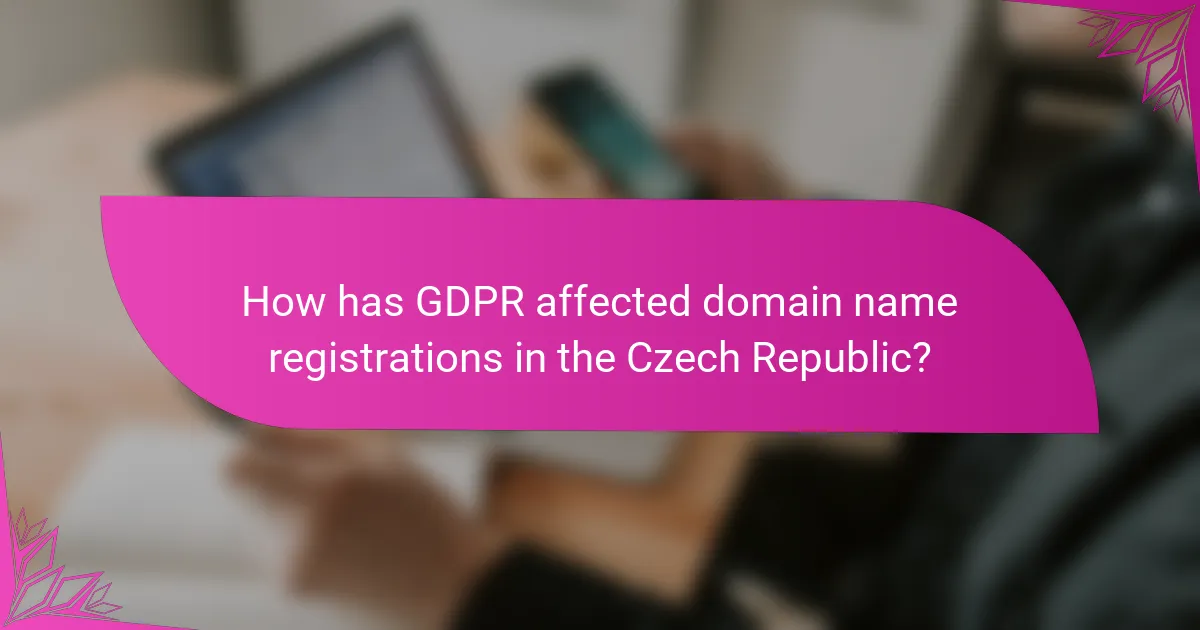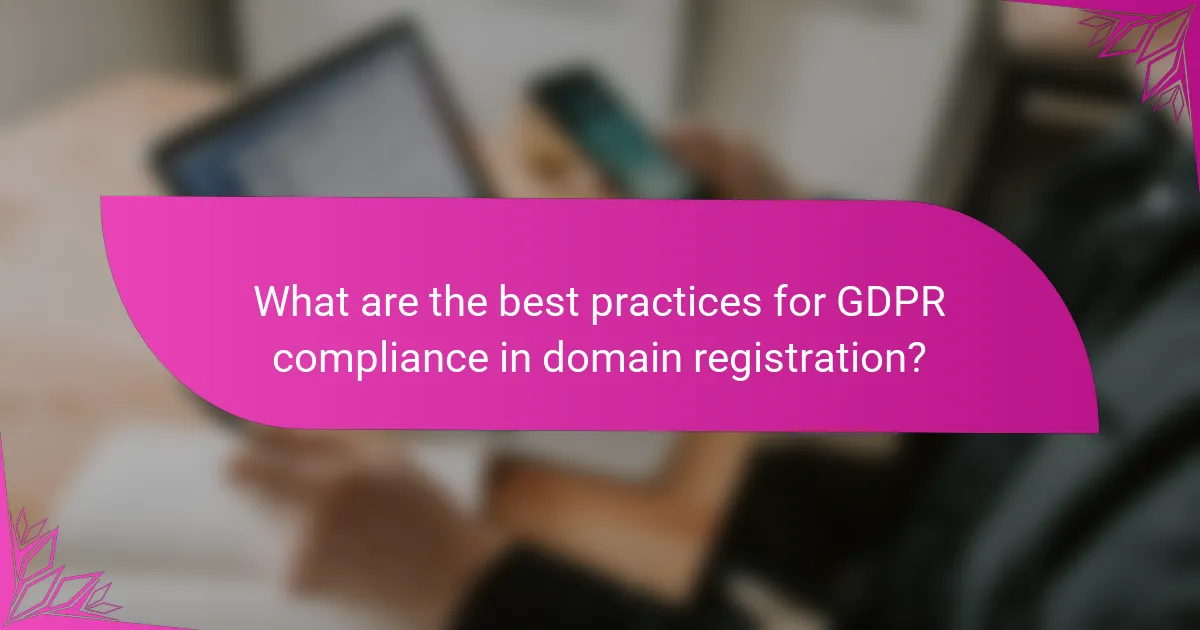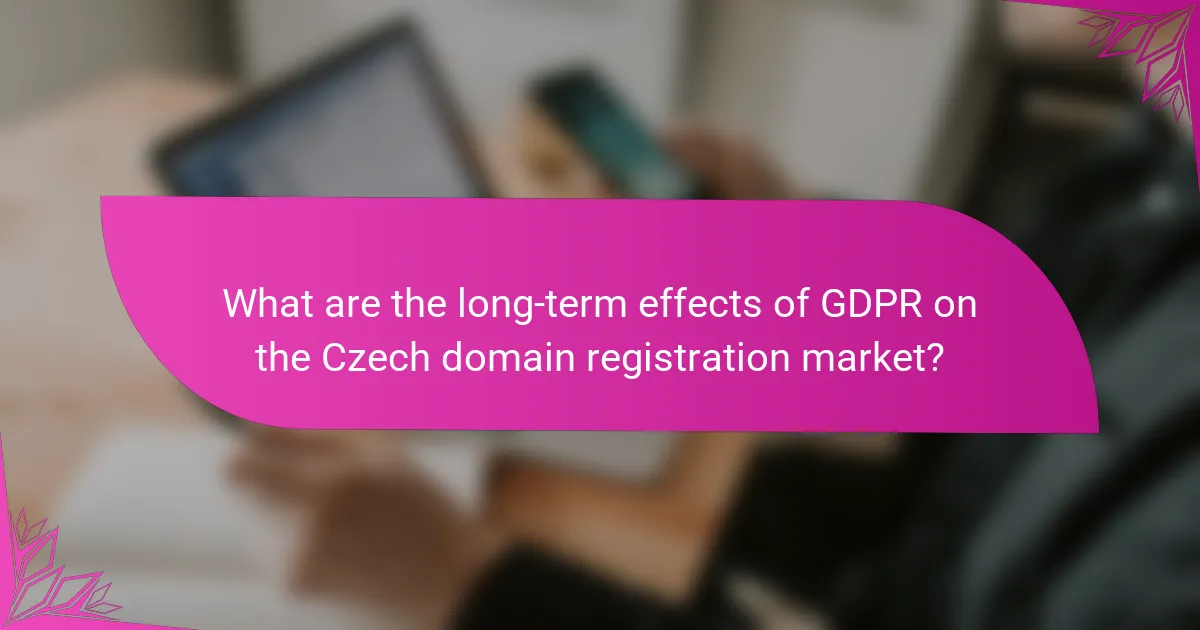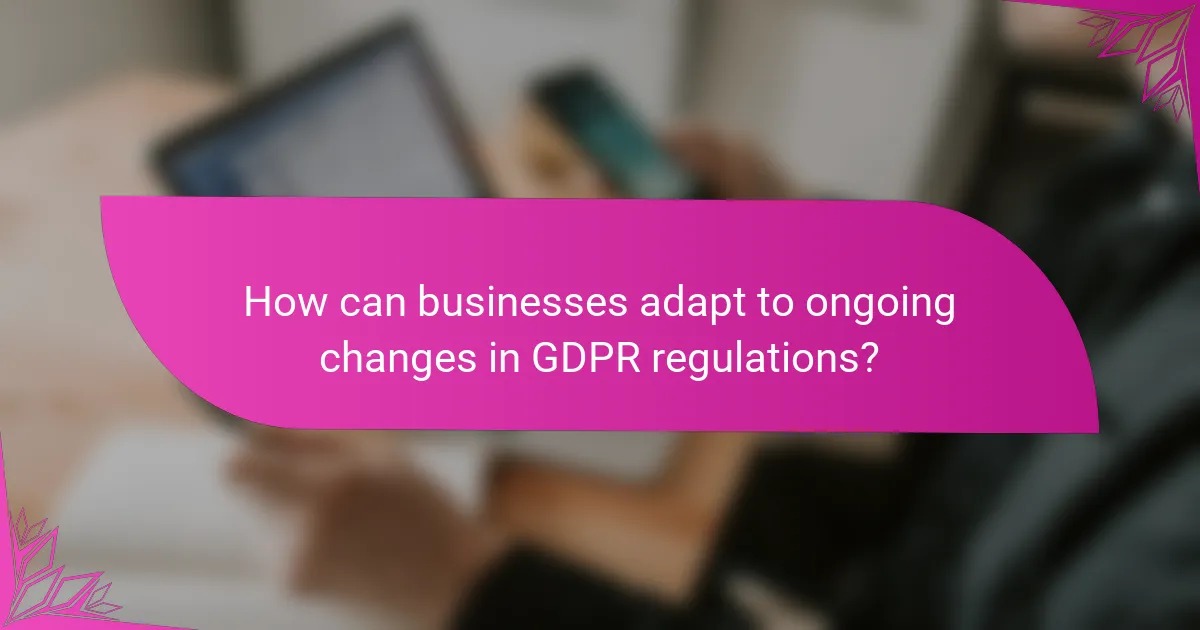The General Data Protection Regulation (GDPR) has profoundly influenced domain name registrations in the Czech Republic, necessitating stricter compliance and altering data management practices. Registrars are now required to prioritize personal data protection, which affects how registrant information is collected, processed, and displayed. This shift presents challenges for businesses, including increased compliance costs and the need for enhanced verification processes to safeguard personal information.

How has GDPR affected domain name registrations in the Czech Republic?
The General Data Protection Regulation (GDPR) has significantly impacted domain name registrations in the Czech Republic by imposing stricter compliance requirements and altering data handling practices. Registrars must now prioritize the protection of personal data, affecting how registrant information is collected and displayed.
Increased compliance requirements
Following the implementation of GDPR, domain registrars in the Czech Republic face heightened compliance obligations. They must ensure that all personal data is processed lawfully, transparently, and for specific purposes. This includes obtaining explicit consent from registrants before collecting or using their data.
Registrars are now required to maintain detailed records of data processing activities and implement appropriate security measures to protect personal information. Failure to comply can result in significant fines, which can reach up to 4% of annual global turnover or €20 million, whichever is higher.
Changes in data handling practices
GDPR has led to a shift in how registrars handle personal data. Many registrars now offer privacy protection services that allow registrants to mask their personal information in the WHOIS database. This means that instead of displaying personal details, the registrar’s information may be shown instead.
Additionally, registrars must ensure that any third-party service providers they work with also comply with GDPR. This includes conducting due diligence to verify that these partners have adequate data protection measures in place.
Impact on registrant privacy
The impact of GDPR on registrant privacy has been largely positive, as it enhances the protection of personal information. Registrants in the Czech Republic can expect greater confidentiality, as their data is less likely to be publicly accessible without their consent.
However, the trade-off is that some registrants may find it more challenging to establish their identity online, as their information is not readily available. This can affect businesses that rely on transparency for trust-building with customers. Registrants should weigh the benefits of privacy against the potential need for visibility in their respective markets.

What are the implications for Czech businesses?
The General Data Protection Regulation (GDPR) significantly impacts Czech businesses by enforcing stricter data handling and privacy standards. Companies must ensure compliance to avoid hefty fines and maintain customer trust.
Enhanced data protection for users
GDPR enhances data protection for users by requiring businesses to obtain explicit consent before collecting personal information. This means Czech companies must clearly inform users about data usage and provide options to opt out.
Additionally, users have the right to access their data and request its deletion. This transparency fosters trust and encourages businesses to adopt more responsible data management practices.
Potential barriers to entry for new registrants
For new registrants in the Czech domain name market, GDPR can present barriers due to the complexity of compliance. Startups may face challenges in understanding the regulations and implementing necessary data protection measures.
Moreover, the costs associated with legal consultations and compliance tools can be significant, potentially deterring new businesses from entering the market. It is crucial for new registrants to seek guidance on GDPR requirements to navigate these challenges effectively.

What challenges do domain registrars face under GDPR?
Domain registrars in the Czech Republic encounter significant challenges under the General Data Protection Regulation (GDPR), primarily related to compliance and customer data management. These challenges include increased costs for legal compliance and the need to adapt verification processes to protect personal information.
Compliance costs and legal risks
The implementation of GDPR has led to heightened compliance costs for domain registrars. They must invest in legal consultations, data protection officers, and updated systems to ensure adherence to regulations, which can amount to thousands of euros annually.
Failure to comply with GDPR can result in substantial fines, potentially reaching up to 4% of annual global revenue or €20 million, whichever is higher. This risk necessitates that registrars maintain rigorous compliance protocols to avoid financial penalties.
Changes in customer verification processes
GDPR mandates stricter customer verification processes, requiring registrars to ensure that personal data is collected and processed lawfully. This may involve implementing more robust identity verification methods, which can slow down the registration process.
Registrars must balance the need for thorough verification with the user experience. Simplifying the process while still complying with GDPR can be challenging, leading to potential customer dissatisfaction if the registration becomes cumbersome.

What are the best practices for GDPR compliance in domain registration?
Best practices for GDPR compliance in domain registration include implementing strong data protection measures and conducting regular audits. These steps help ensure that personal data is handled responsibly and in accordance with the regulation.
Implementing robust data protection measures
To comply with GDPR, domain registrars must adopt comprehensive data protection measures. This includes encrypting personal data, ensuring secure data storage, and limiting access to authorized personnel only. For instance, using SSL certificates can help protect data during transmission.
Additionally, registrars should provide clear privacy policies that outline how personal data will be used and stored. This transparency builds trust with customers and ensures compliance with GDPR’s accountability principle.
Regular audits and compliance checks
Conducting regular audits is essential for maintaining GDPR compliance in domain registrations. These audits should assess data handling practices, identify potential vulnerabilities, and ensure that all processes align with GDPR requirements. A typical audit might occur annually or bi-annually, depending on the volume of data processed.
Compliance checks should also include reviewing contracts with third-party vendors who may access personal data. Ensuring that these partners also adhere to GDPR standards is crucial for overall compliance and risk management.

How can businesses ensure GDPR compliance when registering domains?
Businesses can ensure GDPR compliance during domain registration by understanding data protection requirements and implementing best practices. This includes consulting legal experts and choosing registrars that adhere to GDPR standards.
Consulting with legal experts
Engaging with legal experts familiar with GDPR is essential for businesses to navigate compliance effectively. These professionals can provide tailored advice on data handling, privacy policies, and necessary documentation.
Legal experts can help identify potential risks associated with domain registrations, ensuring that businesses are aware of their obligations regarding personal data. They can also assist in drafting terms of service and privacy notices that align with GDPR requirements.
Using GDPR-compliant registrars like Active 24
Selecting a registrar that is GDPR-compliant, such as Active 24, is crucial for maintaining data protection standards. These registrars implement necessary measures to safeguard personal information and ensure that data processing aligns with GDPR regulations.
When choosing a registrar, verify their compliance certifications and data handling practices. Look for features such as data encryption, secure access controls, and transparent privacy policies to ensure your domain registration process is fully compliant with GDPR.

What are the future trends in domain registration post-GDPR?
Future trends in domain registration after GDPR are increasingly leaning towards enhanced privacy measures and compliance with evolving regulations. Registrars are adapting their services to meet the demands for data protection while ensuring that domain management remains efficient and user-friendly.
Increased focus on privacy-focused domain services
As GDPR emphasizes the protection of personal data, domain registrars are prioritizing privacy-focused services. This includes offering domain registration options that allow for anonymized registration, where personal information is shielded from public view in the WHOIS database.
Many registrars are now providing additional features such as privacy protection services, which can range from a few euros to tens of euros annually. These services help users maintain their anonymity while still complying with legal requirements.
Emergence of new regulations affecting domain management
In the wake of GDPR, new regulations are emerging that impact how domains are managed and registered. Registrars must stay updated on both local and international laws that govern data protection and privacy, which can vary significantly across regions.
For instance, in the Czech Republic, businesses must ensure their domain registration practices align with GDPR stipulations, which may involve regular audits and updates to their data handling processes. Failure to comply can lead to significant fines, making it crucial for registrars to adapt swiftly to these changes.

What are the long-term effects of GDPR on the Czech domain registration market?
The General Data Protection Regulation (GDPR) has significantly influenced the Czech domain registration market by promoting stricter data privacy measures and enhancing transparency. As a result, registrars are adapting their practices to comply with these regulations while also addressing user concerns about data protection.
Shift towards more transparent data practices
GDPR has led to a marked shift in how domain registrars handle personal data. Registrars are now required to be more transparent about their data collection and processing practices, ensuring that users are informed about how their information is used. This includes providing clear privacy policies and obtaining explicit consent from users before processing their data.
As a consequence, many registrars in the Czech Republic are implementing tools that allow users to manage their privacy settings effectively. This may include options for anonymizing personal information associated with domain registrations, which enhances user trust and compliance with GDPR mandates.
Potential growth in niche domain services
The changes brought about by GDPR are likely to spur growth in niche domain services that cater to specific user needs, particularly around privacy and data protection. Registrars may offer specialized services such as privacy protection, which masks the personal details of domain owners from public databases.
Additionally, businesses focusing on GDPR-compliant domain registration services may emerge, targeting organizations that prioritize data security. This trend could lead to a diversification of offerings in the Czech domain market, allowing consumers to choose services that align with their privacy preferences and compliance requirements.

How can businesses adapt to ongoing changes in GDPR regulations?
Businesses can adapt to ongoing changes in GDPR regulations by implementing robust data protection measures and staying informed about updates. This involves regularly reviewing data handling practices and ensuring compliance with the latest legal requirements.
Understanding GDPR compliance requirements
GDPR compliance requires businesses to protect personal data and uphold individuals’ privacy rights. Key requirements include obtaining explicit consent for data processing, ensuring data portability, and allowing users to access or delete their data upon request.
Organizations must also appoint a Data Protection Officer (DPO) if they process large amounts of personal data or handle sensitive information. Regular training for employees on GDPR principles is essential to maintain compliance.
Implementing data protection strategies
To implement effective data protection strategies, businesses should conduct regular audits of their data processing activities. This helps identify potential vulnerabilities and ensures that data is collected, stored, and processed securely.
Utilizing encryption, access controls, and anonymization techniques can further enhance data security. Companies should also develop clear privacy policies that outline how personal data is used and the rights of individuals regarding their data.
Monitoring changes in GDPR regulations
Staying updated on changes in GDPR regulations is crucial for ongoing compliance. Businesses can subscribe to legal updates, attend workshops, or consult with legal experts specializing in data protection.
Establishing a compliance team dedicated to monitoring regulatory changes can help businesses respond swiftly to new requirements. Regularly reviewing and updating data protection policies ensures alignment with current regulations.
